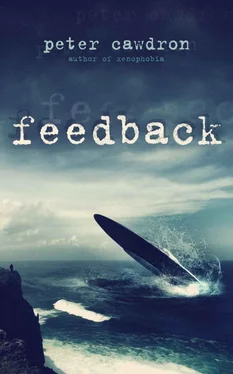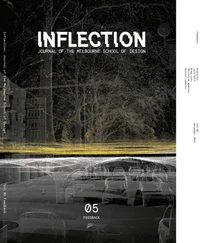Peter Cawdron - Feedback
Здесь есть возможность читать онлайн «Peter Cawdron - Feedback» весь текст электронной книги совершенно бесплатно (целиком полную версию без сокращений). В некоторых случаях можно слушать аудио, скачать через торрент в формате fb2 и присутствует краткое содержание. Год выпуска: 2014, ISBN: 2014, Издательство: Smashwords, Жанр: Фантастика и фэнтези, на английском языке. Описание произведения, (предисловие) а так же отзывы посетителей доступны на портале библиотеки ЛибКат.
- Название:Feedback
- Автор:
- Издательство:Smashwords
- Жанр:
- Год:2014
- ISBN:9781310079849
- Рейтинг книги:3 / 5. Голосов: 1
-
Избранное:Добавить в избранное
- Отзывы:
-
Ваша оценка:
- 60
- 1
- 2
- 3
- 4
- 5
Feedback: краткое содержание, описание и аннотация
Предлагаем к чтению аннотацию, описание, краткое содержание или предисловие (зависит от того, что написал сам автор книги «Feedback»). Если вы не нашли необходимую информацию о книге — напишите в комментариях, мы постараемся отыскать её.
Feedback
Feedback — читать онлайн бесплатно полную книгу (весь текст) целиком
Ниже представлен текст книги, разбитый по страницам. Система сохранения места последней прочитанной страницы, позволяет с удобством читать онлайн бесплатно книгу «Feedback», без необходимости каждый раз заново искать на чём Вы остановились. Поставьте закладку, и сможете в любой момент перейти на страницу, на которой закончили чтение.
Интервал:
Закладка:
“This is bad,” the brother mumbled under his breath. “We should be gone by now. The guard will change soon. We should have left him and run while we could.”
The boy looked up at the North Korean soldier, but not with fear. He appeared to be curious, perhaps amused.
The soldier was smoking a cigarette, his rifle slung over his shoulder. Sucking in hard, the hand-rolled paper of the cigarette flared slightly. Bits of smoldering tobacco fell from the tip, drifting lazily to the muddy gravel.
“It’s going to be OK,” the boy said in English, reaching out and taking the soldier’s hand.
Sun-Hee’s brother jumped, jerking away from the child as though he’d received a jolt of electricity. Lee doubted he understood English. Was it that those words sounded so strange in another language that alarmed him? Or did he fear the boy? The man looked panicked, like a wild animal caught in a snare. His hands were shaking, his eyes wide with terror.
“Come,” the soldier said with a tremor in his voice, marching off on the gravel. With his good hand, Lee took the child’s tiny one and followed after the jittery soldier.
They crept along the side of the wooden administration building, staying in the shadows. As they approached the motor pool at the back of the camp, Sun-Hee’s brother held up his hand, signaling for them to stop.
He peered around the corner.
Through the quiet of the night, Lee could hear the soft crunch of boots on gravel.
Another guard was approaching from the far side of the hut.
Sun-Hee’s brother waved, batting at the air behind him with his hand, signaling for them to slip beneath the crawlspace below the admin building.
He was still wearing the general’s coat and Lee thought about trying to bluff his way past the guard, but the child would raise too many questions. This wasn’t some soldier half-asleep on a chair. If the guard looked too closely at him, they were finished.
Lee crouched and began to crawl under the wooden floor, but with his injured hand he was moving too slowly. He’d barely clear the edge of the building before the guard was on them, and the boy would still be in the open.
Sun-Hee’s brother straightened. Out of the corner of his eye, Lee could see he was trying to look natural. He tossed his cigarette on the ground, crushing it beneath his boot.
There was nothing else Lee could do. He had to drop and roll regardless of his injured hand.
“Quick,” he whispered, tucking his right hand up against his chest as he fell on his shoulder and rolled into the mud and dirt. Being smaller, the boy was able to scoot in beside him.
Pain flared through his hand.
Lee crawled forward on his elbows, moving between the concrete support pillars keeping the raised building off the ground. The boy stayed beside him. Lee’s eyes never strayed from the legs of the guard walking up to Sun-Hee’s brother.
“Where have you been?” the guard barked.
“Taking a shit!”
“Ha,” the guard said. “You were gone too long. What were you doing? Laying an egg?”
“Yeah,” Sun-Hee’s brother replied, relaxing and laughing with the guard.
“Don’t leave your route, you big fat hen!” the guard said, extending his metaphor. He laughed at his own wit, adding, “Un-Yong will have you cleaning the latrine if he catches you slacking off.”
“I know,” the brother replied as the guard continued past him, his boots falling with an almost hypnotic rhythm on the gravel, grinding and crunching at a leisurely pace.
Lee crept forward beneath the building, working with his elbows and his knees. He could see the motor-pool across the driveway.
Sun-Hee’s brother rounded the corner. He crouched beside them as Lee wriggled out of the shadows.
“Stay here.”
“No,” Lee whispered under his breath. “This isn’t going to work. If that guy sees the guard inside the admin building is gone, he’s going to investigate and raise hell. Besides, as soon as you start one of these vehicles, you’re going to wake the camp.”
“Stay,” the brother repeated, thrusting out his hand.
“But—” Lee began as the brother ignored him, jogging away on the noisy gravel.
“ Fuck! Fuck! Fuck! ” Lee swore under his breath.
Memories of being caught and savagely beaten in the village haunted him. The concrete support pillars and wooden floor above felt claustrophobic around him, as though they were closing in on him, forcing him out into the night. He wanted to crawl out and run, even though he knew he wouldn’t get far on foot.
There had to be a perimeter fence out there somewhere hidden in the darkness.
Lee wouldn’t put it past the North Koreans to have lined the perimeter with mines, they had certainly built plenty and were paranoid about being attacked.
The front gate was the only way in or out, but getting out in a car or a truck was suicide. They’d be cut down by machine gun fire. Hollywood might make cars out to be bulletproof, but Lee knew better. Rounds from an AK-47 would punch through sheet metal without losing any of their lethal momentum. They’d pass through a car door like a scrap of paper.
“ Shit! ” he swore, louder this time, no longer talking in a whisper.
“It’s OK,” the boy said, resting his hand on Lee’s shoulder. “You make it! You escape from here, I know you do.”
Lee took a deep breath, drawing in the cold, damp air. The child’s use of the past tense to describe the future was creepy. How could a boy of three or four know that? He couldn’t.
“Who are you? Where are you from?”
“It’s me, professor,” the boy said. “It’s me, Jason!”
“Professor?”
Lee was perturbed. He was sure Jason had confused him with someone else. Lying there with the cold, wet mud soaking through his clothes, Lee couldn’t help but wish he was caught in a dream. For him, it was a nightmare, but for this young boy, the night seemed to hold a mythical, magical quality. The boy should have been afraid, terrified, but his eyes were peaceful, his voice was calm.
“My name is John Lee, Captain John Lee of the South Korean Coast Guard. I’m going to get you out of here, but I need you to work with me, OK? I need you to do exactly what I say, OK?”
The boy nodded. And what exactly is it you are going to do? Lee wondered, keeping that thought to himself.
“I trust you, professor.”
“I’m not,” Lee began, but the innocence of childhood in Jason’s eyes made him pause. If a case of mistaken identity could help the young boy through this without freaking out, then so be it. What the hell did the Americans and the North Koreans want with such a young child anyway? Lee noticed the child still had his crayon and paper, clutching it to his chest like a talisman.
The boy spoke matter of factly, as though he were talking to another child, saying, “You are Professor Lachlan. I remember you.”
Lachlan. That was his mother’s maiden name. His mother was a Korean-American. She had been a lieutenant in the US Army, working as a triage nurse in Seoul. She’d met his father while on joint exercises and they’d settled in South Korea after they married. Like most married women, his mother had taken his father’s surname, Lee. Why was this child calling him by his mother’s maiden name?
Curious, Lee asked, “How old are you, Jason?”
“I don’t know.”
“We’re in danger. You need to understand that.”
The boy nodded, saying, “But you will find a way out. You always do.”
Lee was tired. He was cold and he was hungry. He was exasperated. Nothing was as simple as this boy assumed. He knew the boy meant well, but Lee was frustrated. Life had stopped being kind to him. Life was cruel. His injured hand throbbed. Deep down, he wanted nothing more than to scream in anguish.
Читать дальшеИнтервал:
Закладка:
Похожие книги на «Feedback»
Представляем Вашему вниманию похожие книги на «Feedback» списком для выбора. Мы отобрали схожую по названию и смыслу литературу в надежде предоставить читателям больше вариантов отыскать новые, интересные, ещё непрочитанные произведения.
Обсуждение, отзывы о книге «Feedback» и просто собственные мнения читателей. Оставьте ваши комментарии, напишите, что Вы думаете о произведении, его смысле или главных героях. Укажите что конкретно понравилось, а что нет, и почему Вы так считаете.












